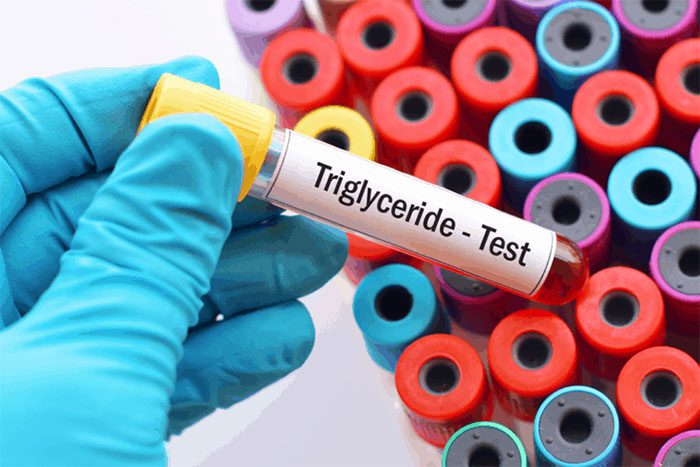The Triglyceride Blood Fat Index is one of the key indicators measured in a lipid panel test. However, not everyone understands what the Triglyceride index is, its role in the body, and the significance of testing this index in diagnosing diseases.
Understanding the Triglyceride Index
Triglycerides are a type of fat that our bodies consume daily. They are also one of the main components of both animal and plant fats. After digestion, Triglycerides are utilized as cellular energy while circulating in the bloodstream.
Triglycerides consist of three fatty acids. Once ingested, they are transported to the small intestine, where they are split and combined with cholesterol to produce energy.
This energy is primarily stored in liver cells and fat cells. If the body accumulates too much Triglyceride, it can lead to high blood fat levels, which can be harmful. Triglycerides adhere to blood vessel walls, forming fatty plaques in arteries that obstruct blood flow. Elevated Triglyceride levels indicate a risk of atherosclerosis, heart attack, hyperlipidemia, fatty liver disease, and stroke…
The Value of the Triglyceride Blood Fat Index

4 levels of Triglyceride blood index.
Patients can determine their Triglyceride levels through a blood test. According to the American Heart Association, Triglyceride levels are classified into four categories:
- Normal Triglyceride level: below 150 mg/dL (1.7 mmol/L).
- Borderline high Triglyceride level: 150 – 199 mg/dL (1.7 – 2 mmol/L).
- High Triglyceride level: 200 – 499 mg/dL (2 – 6 mmol/L).
- Very high Triglyceride level: above 500 mg/dL (above 6 mmol/L).
What is a Triglyceride Test?
To check Triglyceride levels, you need to undergo a lipid panel test to diagnose any changes in lipoproteins. A Triglyceride test can indicate inflammation in the pancreas and the risk of atherosclerosis. It is recommended to regularly test the following indicators:
- Cholesterol
- HDL
- LDL
- Triglyceride
You should fast for 9 – 14 hours and avoid alcohol for 24 hours before the test, only drinking water during this period. Your doctor may ask you to stop taking certain medications prior to the test, so it’s advisable to discuss any medications you are currently using with your doctor.

Triglyceride testing can indicate inflammation in the pancreas.
Complications of Elevated Triglyceride Levels
Each individual will have different Triglyceride levels. When Triglyceride levels rise, it can affect blood circulation and have many adverse effects on health.
High Triglyceride levels in the blood increase the risk of atherosclerosis, especially for those with low HDL cholesterol levels or those suffering from type 2 diabetes.
Fat accumulation over time in blood vessel walls can narrow coronary arteries, leading to heart attacks and strokes. If Triglyceride levels are frequently above 200 mg/dL, individuals are at risk for atherosclerosis, hypertension, obesity, and hyperlipidemia…
Causes of Increased Triglycerides
There are many causes of high Triglyceride levels, including:
- Smoking
- Lack of physical activity
- Genetic factors
- Excessive alcohol consumption
- Overweight or obesity
- Hypothyroidism, diabetes, and metabolic syndrome
- Consumption of a diet high in refined carbohydrates and saturated fats
- Use of certain medications including estrogen, protease inhibitors, and corticosteroids
How to Manage Triglyceride Levels
High Triglyceride levels are a common condition today. To best protect your health, it is important to maintain Triglyceride levels low or within the normal range. Here are methods to help manage high Triglyceride levels:
- Engage in regular exercise for at least 30 minutes each day. Aim for at least 5 days of exercise per week to increase good cholesterol levels in the body.
- Limit the intake of harmful fats such as fried foods, fatty meats, animal fats, and processed meats.
- Reduce consumption of high-sugar foods.
- Opt for low glycemic index foods such as whole grains and legumes.
- Eat more fish, especially those high in omega-3 fatty acids like salmon, mackerel, and sardines.
- Avoid alcohol and alcoholic beverages.
- Do not smoke.
- If you have conditions such as diabetes or hypertension, ensure regular health check-ups to manage your health effectively.
Attention Deficit Hyperactivity Disorder (ADHD): Causes, Symptoms, and Treatment





















































